Note: if you want to skip the intro and go straight to the evidence, click here.
This week my inbox was flooded with emails from friends and acquaintances – who had forwarded me the link to the latest Dove “Real Beauty” video, highlighting the disconnect between women’s perceptions of their own attractiveness and how outsiders see them. The point of the video is to show that women are often too critical of their looks. I was glad to see how this video sparked important conversations in the blogosphere and social media. But there’s a dark side to Dove that many people are unaware of.
I had written a blog post about some problematic aspects of Dove’s “Real Beauty” campaign back in October 2008. Recently, while researching material for my feature-length documentary, I came across more evidence that supported my earlier points. Thing is – I’ve been reluctant to speak up about these issues for several reasons. The key ones:
- Dove’s campaigns are the only ones that – at least on the surface – promote positive body image, in an ocean of toxic advertising set to make women feel insecure about their looks
- I am acquainted with several people connected to Dove’s Real Beauty campaign – they’re good-intentioned people I deeply respect and admire.
- I actually really like Dove’s videos
So, I considered these issues and thought about the latest email I received from my friend S. I wondered, would she feel that same way if she knew the other side of the story? My hunch: probably not. Staying quiet would be the easy thing to do. But is it the right thing to do?
So, without further ado, I am addressing the big elephant in the room. Below you will find my original post about Dove – with some tweaks and updates reflecting new evidence I recently discovered.
About three months ago, upon completing the first phase of research for my film, I held two slideshow presentations in front of an audience of friends, acquaintances, and a few people working in the TV/movie industry in Paris. Very much in the style of Al Gore’s “An Inconvenient Truth.”
At the heart of the presentation is the assertion that the obsession over the pursuit of the perfect female body is one of the integral parts of the capitalist system. If women were suddenly content with their appearance – accepting their body size, skin tone, wrinkles, graying hair, and the size and shape of their breasts, amongst other things – entire industries would collapse. Indeed worldwide revenues for cosmetics, dieting products, and cosmetic surgery totaled almost 500 billion dollars in 2006. Thus the saturation of images in advertising and mass media promoting an idealized, surgically-enhanced beauty that is impossible to achieve.
Well, during my presentations I would invariably get asked about the company Dove and its campaign for “Real Beauty.” Wasn’t that refreshingly positive? People would ask. It is a question that comes up every time I talk about my project. The short answer? Yes and no.
The people at Dove have actually exploited a void in the marketplace. By introducing so-called women with “real” bodies, they distinguished themselves from their competitors. According to the New Yorker, after the introduction of their “Real Beauty” campaign, Dove’s sales shot up 700% in the U.K.
The problem(s) with Dove’s “Real Beauty” campaign:

#1 – Dove’s parent company is Unilever, maker of Axe, Fair & Lovely and Slim-Fast
Dove’s “Real Beauty” campaign has criticized advertising and mass media with videos like “Evolution” (about digital retouching) and “Onslaught” (about the effects of toxic media messages on young girls).
Brilliant, borderline Machiavellian marketing move? Dove’s parent company Unilever also owns the Axe line (Lynx in the UK) of men’s care products. And Axe / Lynx’s brand identity is all about the unabashed objectification of women. Their ads are so outrageous they are often banned, achieving cult-like status. I highly recommend you watch Dove’s Onslaught PSA – slogan: “talk to your daughter before the beauty industry does” – before you see the clips below.
Some recent examples – from the UK:
Watch “Lynx Rise” on YouTube – link opens in a new window.
Watch “Lynx Jet” on YouTube – link opens in a new window.
Update: I just found a clip from the communications agency responsible for the Lynx Jet campaign. They are gloating about all the press they received following accusations of sexism. Starts at 2:40: click here to see the video.

If you can’t read the small type, it says: “Controversy is a measure of success!”
Unilever also owns Fair and Lovely – a line of skin-whitening creams sold in India, Southeast Asia, and the Middle East. The commercials – running on borderline racist themes – always feature unhappy, socially rejected women and men with a dark skin color, who are magically transformed into popular people after using “Fair and Lovely” skin-whitening cream. The ultimate message is that a lighter skin tone gets them the object of their affection and/or a top job. An example from the Middle East:
Watch “Fair and Lovely” on YouTube – link opens in a new window.
Up until a few years ago, big corporations like Unilever could be reassured by the fact that their campaigns in faraway lands were limited to those markets. If you were American, the only way you could see an Indian commercial would be to go to India. Well, thanks to the magic of YouTube – and sometimes the help of Google Translate – you can easily find commercials from all over the world. My latest find is this Dove India commercial about skin whitening deodorant – uploaded on Dove India‘s YouTube channel this past January:
Watch the ad for Dove’s “Skin Whitening Deodorant” on YouTube – link opens in a new window.
If you still had any doubts about Unilever’s business savvy, you should know that the company acquired Slim-Fast (maker of weight loss drinks) and Ben & Jerry‘s (high calorie ice cream) on the same day: April 12th 2000. Prudential Securities analyst John McMillin commented in the Wall Street Journal:
“The fact that one product makes you fat and one makes you thin is funny, but they didn’t say boo to address that.”

#2 – The people behind Dove’s Real Beauty ads are industry bigwigs, who are otherwise working as “Illusionists” on other campaigns
The ad agency Ogilvy and Mather, Annie Leibovitz, and the world’s highest paid photo retoucher Pascal Dangin are behind the ads (Leibovitz and Dangin took care of the print campaign).
To make you understand the scope and influence of Dangin’s work: in the March 2008 issue of Vogue US Dangin retouched 144 images – the cover, 36 fashion pictures, and 107 ads for his clients.
#3 – The Dove Real Beauty print ads are Photoshopped
As you know, Dove’s Real Beauty campaign rose to prominence thanks to its “Evolution” PSA about photo retouching. The video ends on the message: “No wonder our perception of beauty is distorted.”
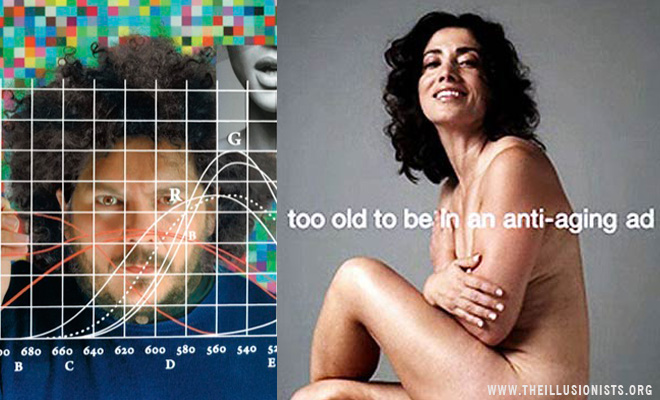
Well, in a New Yorker profile of photo retoucher Pascal Dangin (in the May 12th 2008 issue), reporter Lauren Collins questioned him about the Dove campaigns:
I mentioned the Dove ad campaign that proudly featured lumpier-than-usual “real women” in their undergarments. It turned out that it was a Dangin job. “Do you know how much retouching was on that?” he asked. “But it was great to do, a challenge, to keep everyone’s skin and faces showing the mileage but not looking unattractive.”
And to this I can only add: “No wonder our perception of beauty is distorted.”
Update: if you want to see what “Real Beauty” is really like, I highly recommend this slideshow from Visura Magazine, showcasing photographer Jodi Bieber’s “Real Beauty” project.

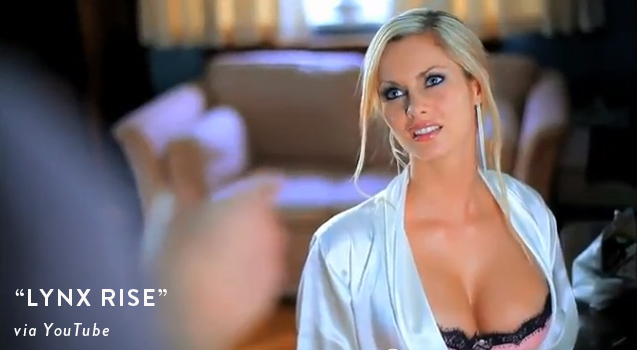


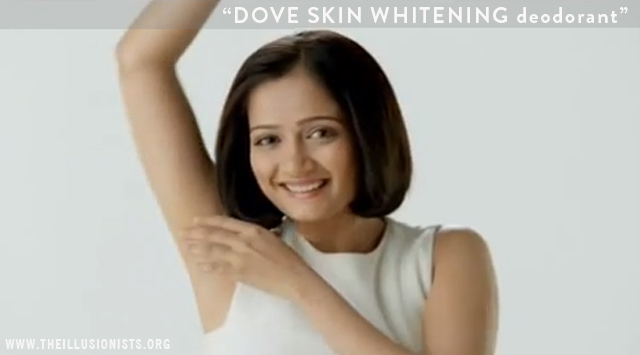
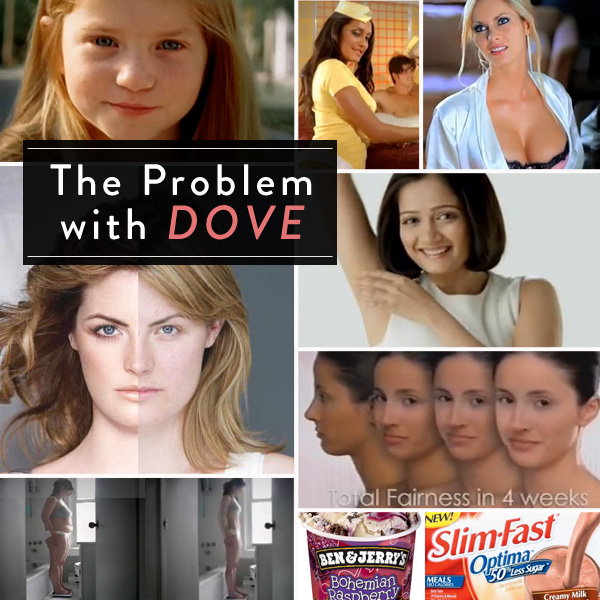

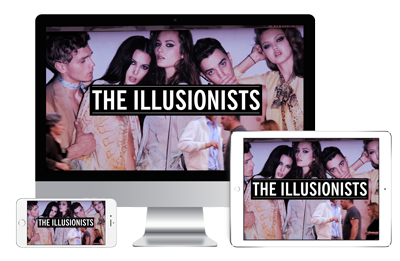
I’m a feminist but I’m also a rationalist. We should not blame dove because of their parent company and the actions that parent company has with their other clients. Also there are lots of skin darkeners in the united states for women to be darker, its a culture thing. We think we are sexier being darker, more confident being darker. If an Indian woman wants to be lighter that is her right as a woman. She has power over her body. Today I put on some bath and body works Vitamine E self tanner. Not because anyone made me or because I think i’m ugly or fat. I did it because i like how it glissens on my skin. I don’t care if anyone but my cat sees my glissining skin. So am i some poor sap that was pressured into darkening my skin? Hell no. My body. My choice!
Love your point, i’ve been wondering about this kind of thing for a while. however, just what is the linkage between Dove having their own ability to do the campaigning (even though it is dishonest) distinct from Unilever?
I’ve had an interesting reaction to these ads too, so I was excited to begin reading your article. But I found that the things you’ve identified not as interesting (okay, the SlimFast and Ben & Jerry’s thing is interesting, but not damning), wasn’t the same reason I wondered about this ad campaign.
For me, it seems like a way for a company to cash in women’s insecurities, by being a false ally in a struggle for self acceptance. This new ad campaign wasn’t shocking because it concluded that these women suddenly realized they thought less of themselves; it was shocking because this friend, this ally to women’s importance was helping them become whole. Let’s do it together! But this friend and ally is really just trying to sell more lotion, soap, deodorant, and shampoo. It almost makes you feel bad not supporting a friend that just paid you a big compliment when you were feeling down on yourself!
And there it is: The formula. “Hey women, here’s how you think of yourselves: Fat, old, and sad. But you aren’t! You’re beautiful, and we love you just the way you are! By the way, our daughter is a girl scout and is doing a fundraising drive. Can I put you down for a few boxes?” Subtle emotional blackmail. No one should be under the impression that a ‘beauty brand’ has any other intentions aside from turning a profit. That’s how business fundamentally operate, especially at this size.
But finally, I will add that I agree with your initial points–I’m not looking down at anyone who has to buy soap and chooses the one that makes them feel the best, physically or emotionally. Dove isn’t bad; it’s just an excellent illusion that they care more than they actually do. If you recognize that going in, it’s fine to be moved by the ad, and to buy the products. But I’m tired of the “friendly corporation” strategy that’s becoming all the rage lately.
There is a difference between a white woman getting a tan, and a woman of color being told that being “fair” makes her “lovely”. For you, it’s a preference, a choice with little stigma; for her, lighter skin is “proof of worth”. #checkyourprivilege
I have heard over and over again via the media that having a tan means you are healthier and more attractive. I have very pale family members who can’t tan naturally and use products to achieve the same goal. They feel that it makes them lovely…healthy…therefore more attractive and therefore more valuable. I think the products are equal in that respect. I agree with Lindsay…our body our choice of product for whatever reason we choose. What we must learn and teach is that we should not be swayed by advertising but rather by the quality and results of the products themselves. Knowledge is power. I don’t buy Dove because of the current ad campaign…but I sure as hell show it to my daughter AND son(this is not a girl only issue). Any little bit helps in building self esteem.
Actually, I disagree. You’re making quite an Orientalist assumption there concerning the cultures of ‘Indian women’. First of all, it’s nowhere near as simple as ‘it’s racist’. Skin colour preferences often have more societal links than just women being told what they should want by the mass media. Pale skin, for example, is linked with spending more time indoors. In cultures where work is predominantly outdoors, a paler visage can be a sign of wealth and privilege as you are assumed to have an indoor job. In more indoor-working cultures, to have darker skin is to show you have the time and money to be outdoors away from work. We really can’t just assume that we’re all racist bastards for indoctrinating those oh-so-powerless women into wanting to be more pale.
You’re also making the assumption that ‘they’ want to be paler because they want to be more like ‘us’. This is pretty self-flattering. While we cannot deny the rapid spread of Western ideals, there are still many places around the world that actively resist and reject them. To want to be paler is along the same lines of thought as pale women wanting to be more tanned. Are they to be accused of idealising India? No.
I disagree both with tanning cremes and skin-lightening cremes only because it indicates a dissatisfaction with one’s own skin. Not because it’s racist.
I need you to google “skin lightening and racism” before you say things like this. It *is* racist to sell skin whitening creams to women of color because we live in a culture that consistently elevates whiteness over anything else. Seriously, it’ll take you less time to google the physical and psychologcal effects of bleaching creams and learn something new than it will to type up a typical response that has been addressed countless times before. Seriously, before you reply, google it. It’s exhausting to have white women tell you that bleaching is on par with tanning.
Oh my goodness its an advertisment…stop overanalysing it! It is made so that the company can sell their product. All companies follow marketing as a strategy whether it be P&G with their for moms campaign or unilever. Its a competive business and all the company is doing is catching the eye of their target audience.
Consumers will buy what they want to buy not because of the “industrial bigwigs” but because of societal pressures in general. Someone who will want to use Slimfast wont use it cause the company is calling her fat but will do so cause SHE thinks she is fat. This is the first advertisement I have ever seen that challenges the views about beauty in society.
What suprises me as that this type of discussion is happening on an advertisment that actually has a positive message! Why aren’t we over analyzing a loreal which is telling women that they need to cake their faces with make up in order to look beautiful? Why arent we analysing burberry/gucci ads that convinces society that wearing their brands gives you status? I feel like that is more a case of cashing in on a women’s insecurity than the dove advertisment.
Why are people look for something negative in something that has given so many people a sense of empowerment? It just shows how humans in general have such a fleeting sense of faith and inherent mistrust that something has a hidden agenda. If you dont like the product then dont buy it but stop ruining the message of the advertisement and making it into something deeper when its not!
Here are just some of Unilevers 400+ brands http://en.wikipedia.org/wiki/List_of_Unilever_brands
I trust all will be boycotted.
Saying it’s racist to want to lighten your skin with creams is like saying it’s racist to darken your skin with tan cream and the like.
I agree with you Rebeckyem. I live in Asia. It’s totally normal to see skin whitening creams and it has nothing to do with racism at all. Somehow the only people who think its really racist are Westerners, especially Americans due to their complex history regarding skin color. For example, I would think pushing skin whitening creams onto black people might offend many people in America but here, it’s a totally different context. If anything, it has to do with classism and not racism.
Also, Rebeckyem, your second paragraph is spot on. Absolutely spot on. It’s not about copying Western ideals. Take it from someone who grew up in Asia…most of us won’t even bat an eyelid at such commercials. Its just like getting a tan in Europe. I think Kat is making way to many assumptions on a superficial level without actually understanding how it works here. On theory it could make sense…but the reality is it’s not true at all. All my parents, grandparents, great grandparents have been fair…its the standard of beauty that has nothing to do with race!
Basically, its all about context. You are judging it based on your own context, but its not always the same elsewhere around the world. Many Asian countries don’t have as much issues with race (not saying they don’t have racism) simply because Asia was pretty homogenous (eg. countries like Japan) for a long long time.
Thank you for your comments. In my post I was talking about India and women of color and I stand by my statement – I truly believe that Indian skin whitening ads have racist undertones.
On the other hand, I totally understand that the Asian skincare market is segmented: in many countries (like China and Japan) having a fair complexion has been a beauty ideal for millennia and it’s associated with prestige, youth and high class. I wasn’t making any sweeping generalizations there. This will be a major point in my documentary… I traveled to Japan, too, and discussed this with sociologists, celebrity make up artists and activists… So stay tuned for more 🙂
I am an Indian woman. I agree with the author on her take on Fair and Lovely products. The difference between lightening and tanning lotions, from a social and cultural point of view, is that you are not penalized for your white shining the west but you suffer varying degrees of discrimination in India I’d you have darker skin tone. Families sometimes consider girls of dark skin a burden given the difficulty in finding grooms in a dowry and arranged marriage system. Dark skin is considered ugly and even a marker of lower social status. The ads mentioned above actually promote and exploit this sickening mindset. It is definitely not a matter of choice for many girls as some commentators have pointed out. I thank author for bringing the hypocrisy of these companies to the attention of western society.
…did you read the article at all?
I will stop buying Lipton tea immediatly but that was the only product on the list I have bought in a long time. House brands and make it yourself stuff, buying second hand and not wearing makeup also helps.
However. The point is to do what you can and let your voice be heard.
Absolutely. I’m white and I’ve never felt pressured to be tan in order to be attractive. For every “California Girl” image that’s sold, there’s another vender peddling the a dark-haired, pale waif. It’s sheer ignorance to think that white people have any pressure re: skin colour.
I agree. I think all skin whitening products, at their core, are racist. I believe your comment could extend to skin whitening products in any country. I remember really getting an idea of how awful these products were when watching a Vice piece on Caribbean Fashion Week and a woman explained that not only do fair-skinned women fare better in society there, but darker skinned women suffer more. Apparently these cremes are incredibly painful and cause irreparable amounts of damage (though I have no doubt that some will try and argue that tanning is similar.) White women are oppressed for being too pale really is a crock of shit.
I do agree with the points mentioned about campaigns depicting women in different lights. However, mentioning the acquisition of opposite brands from Unilever fails in context. It’s not simply about what the products aim to do (ex, make you fat or loose weight), but about the consumer’s needs/wants. I might not need to loose weight and would love to indulge in Ben and Jerry’s, while a friend might prefer to substitute her meal for a Slim Fast, and that is perfectly fine from a product stand point. My point is, it’s not about the products out there, but about the way they’re being communicated.
I’m sorry. If there wasn’t such a high demand For products for skin lightening, it wouldn’t be sold. Companies make hair dye and nobody calls them racists.
People make their own decisions. Just because you grow up in a country where darker skin is less desirable, doesn’t mean Dove is doing it to those people. They are just selling products that people WANT to buy. Demand. Yes, they are cashing in, but it is not unethical. People in those countries are the ones who are creating the low self esteem.
It’s like if everyone in your town has gone crazy boer having short red hair and suddenly you discover a homemade hair dye that dyes a perfect red. Are you creating racism against brunettes or blondes? Hey, suddenly all commercials show red heads. Men start dating more red heads. Do you stop selling your hair dye?
And, if you need/ want to lose weight, buy Slim Fast. If you don’t need/ want to lose weight and love ice-cream, buy Ben And Jerry’s. It’s delicious. Big deal that Unilever owns both. Not everyone is on a diet….not everyone eats ice-cream. I love Ben and Jerry ‘s and if I ever get fat eating too much of it…it’s my own fault. Who cares.
I really enjoy your eloquence. It has become a bit of a rarity. Kuddos!
Not true, to be ‘pale skinned’ in the UK is considered unattractive, unhealthy etc.
As a VERY white person…I can say I am not considered unemployable, nor unattractive or unmarriageable in the uk, where I recently lived, or in North America, where I currently live. There are preferences for ppl not to look sickly pale (SES factors in as well) but it’s not on the form of discrimination. I’ve never had a problem getting a job nor getting a bf. (also some pretty hot pale women on the uk…think about it) What Meera is referring to can’t be compared to what we white go through…whole diff ball game.
OH PLEASE Laura it’s not comparable and you know it -___-“
Dove’s ads are a little silly, here’s an example of one of such ads:
http://digestivepyrotechnics.blogspot.com/2014/12/alternate-ending-dove-body-wash-ad.html
None of this has anything to do with the effectiveness of the actual product that being Dove beauty bar. Honestly, there are marketing schemes out there that are much more offensive than anything Dove has said or done. Keep perspective folks there’s nothing wrong with Dove, if Unilever wants to capitalize on “conflicting” products (such as Ben & Jerry’s versus slim fast) what does that have to do with the EFFECTIVENESS OF DOVE SOAP.? Say it with me: NOTHING. Some feminist bitch decided to bash dove beauty bar based on the parent company’s practices, and ignore the actual efficacy of the product DOVE SOAP. at this juncture, let me disabuse you of the notion that I’m a man or beaten down housewife who is barefoot and pregnant in the kitchen. I’m for women’s rights/equality blah blah blah with this nonsense is over the top. Besides, feminism is a rather jaded, myopic view of the world. Why don’t you talk about Redken, Dermalogica or Aveda? Their practices to make their products and the negative effects these companies have on developing countries is much worse than the “real beauty” campaign. Google it. Sweatshops turn out a hell of a lot more than textiles, folks.
If you, as a female and a reader are so gullible that you fall for the “real beauty” shit that Unilever has made around dove soap then you’re a dummy.
No Laura’s absolutely right. Here in Canada to be pale skin equals unhealthy “not getting out enough”
As much as the article also talks of the abhorrent objectification of women, please may I add my two-penneth, as a man.
Fair and Lovely is constantly advertised on TV in India, I just returned from India 7 days ago. All the actors are pale and the models used in advertising aren’t even Indian half of the time, whether it is for “fair and lovely” or when trying to sell air-conditioning units . It is a throw back from colonial times and the inherited (read: forced) self-hatred of their natural skin colour. It is a shame, but now still very prevalent amongst the middle and upper classes, they look down upon darker skinned Indians. It is not a religious, Hinduism, class thing; it is out-and-out internal racism, differentiated not by colour, but by shade!
I see it as nothing but an extension or continuation of the racist mindset impregnated by the slave masters of old. Perfectly captured in the afrobeat tune “Fallacy” where the lyrics refer to how the invaders, colonisers and missionaries of the African continent justified violence, genocide and slavery by saying the dark skinned person had a lesser intellect and was therefore worth less. Indeed the native Aborigine was referred to as “Fauna and Flora”, not even as a human being. So when that thought process is then deeply ingrained and programmed into the natives after years of colonisation, it is a hard thing to recover from. And it is only perpetuated by the existence of overtly race -based advertising and products. Kxx
As much as the article talks of the abhorrent objectification of women, please may I add my two-penneth.
Fair and Lovely is constantly advertised on TV in India, I have just returned from India 7 days ago. All the actors are pale and the models used in advertising aren’t even Indian half of the time, but of caucasian descent; whether it is for “fair and lovely” or when trying to sell air-conditioning units . It is a throw back from colonial times and the inherited (read: forced) self-hatred of their natural skin colour. It is a shame, but now still very prevalent amongst the middle and upper classes, they look down upon darker skinned Indians. It is not a religious, Hinduism, class thing; it is out-and-out internal racism, differentiated not by colour, but by shade!
I see it as nothing but an extension or continuation of the racist mindset impregnated by the slave masters of old. Perfectly captured in the afrobeat tune “Fallacy” where the lyrics refer to how the invaders, colonisers and missionaries of the African continent justified violence, genocide and slavery by stating the dark skinned person had a lesser intellect and was therefore worth less. Indeed the native Aborigine was referred to as “Fauna and Flora”, not even as a human being. So when that thought process is then deeply ingrained and programmed into the natives after years of colonisation, it is a hard thing to recover from. And it is only perpetuated by the existence of overtly race-based advertising and products. Kxx
Even if you take the Dove campaign as a standalone, it’s still perpetuating the idea that a woman’s primary purpose is decorative and that any other characteristics come second to that.